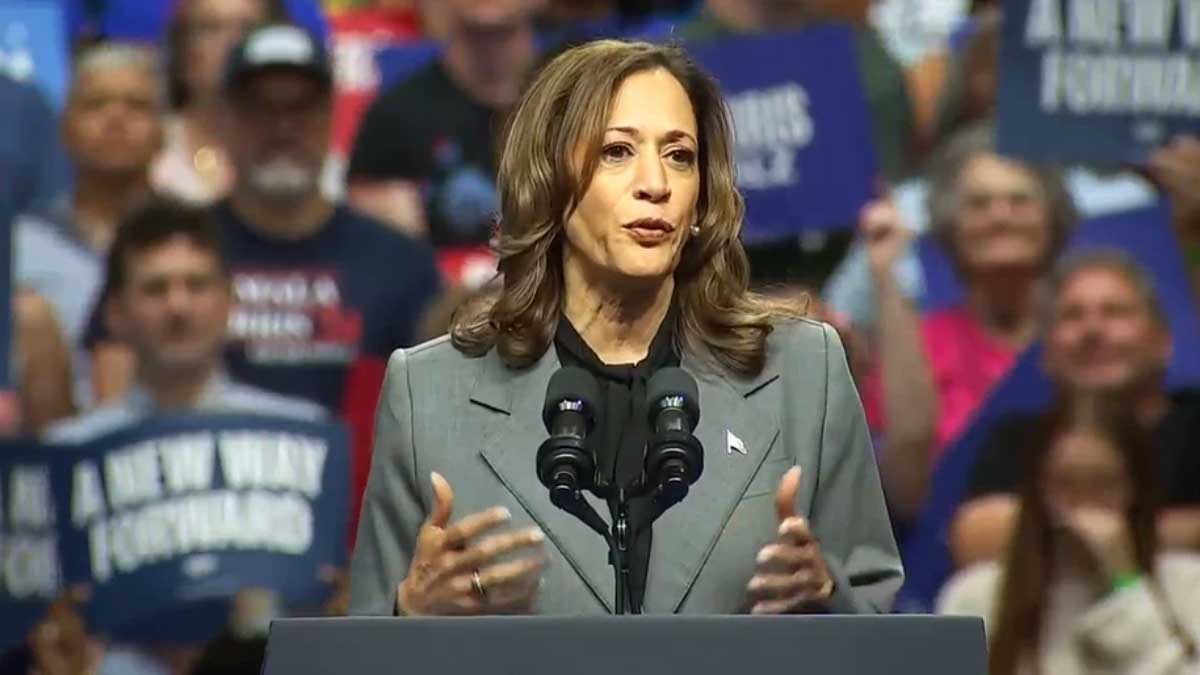- Home
- Billionaires
- Investing Newsletters
- 193CC 1000
- Article Layout 2
- Article Layout 3
- Article Layout 4
- Article Layout 5
- Article Layout 6
- Article Layout 7
- Article Layout 8
- Article Layout 9
- Article Layout 10
- Article Layout 11
- Article Layout 12
- Article Layout 13
- Article Layout 14
- Article Sidebar
- Post Format
- pages
- Archive Layouts
- Post Gallery
- Post Video Background
- Post Review
- Sponsored Post
- Leadership
- Business
- Money
- Small Business
- Innovation
- Shop
Recent Posts
Harris Vows Crackdown on Price Gouging in First Interview

In her first solo interview as the Democratic nominee for Vice President, Kamala Harris made a bold promise to crack down on companies engaged in price gouging. Speaking with MSNBC’s Stephanie Ruhle on Wednesday night, Harris reiterated her commitment to a controversial economic plan aimed at addressing the rising cost of food. “I’m going to go after companies that are price gouging,” she declared, signaling that her focus is on protecting consumers from exploitative practices during times of economic stress.
Harris’ stance on price gouging is a key element of her broader economic platform, which she has been vocal about throughout the 2024 campaign. She positions this plan as an essential tool for addressing the inflationary pressures currently facing American families, particularly at the grocery store. In her conversation with Ruhle, Harris defended her strategy against criticisms that it amounts to government-imposed price controls, which some argue could stifle competition. “To be very frank,” Harris said, “I am never going to apologize for going after companies and corporations that take advantage of the desperation of the American people.”
The idea of cracking down on price gouging is not entirely new, as many states already have laws in place that prohibit the practice during emergency situations. Typically, these laws are triggered by declarations of emergencies, such as natural disasters or pandemics, when unscrupulous companies are prone to significantly increase the prices of essential goods. However, the scope of Harris’ plan has caused some confusion and debate. While she initially framed her proposal as an emergency measure, her campaign has also discussed broader applications, particularly concerning food prices, which have been a focal point of public concern as inflation has skyrocketed in recent years.
In her interview, Harris suggested that her plan would be implemented during emergency situations, when companies “jack up prices” on essential goods. However, the specific mechanisms for enforcing this ban remain somewhat unclear. Critics have raised questions about whether such a measure would be feasible or effective outside the context of emergency declarations, and whether it would apply to other sectors beyond groceries.
Food inflation, in particular, has become a hot-button issue in the 2024 election cycle. According to the U.S. Department of Agriculture, grocery prices have risen by 25% from 2019 to 2023, making it a pressing issue for voters. The cost of certain food categories, such as fats and oils, saw the steepest rise, with prices jumping by 8.7% from 2022 to 2023 alone. This surge in food prices has contributed to the economic strain felt by American households, many of whom are grappling with the rising cost of living. Harris has tapped into this widespread frustration with her focus on curbing what she describes as corporate greed and unfair pricing practices.
The Democratic nominee’s plan specifically targets the grocery industry, where prices have soared due to a combination of supply chain disruptions, rising production costs, and corporate mergers that have consolidated power in the hands of a few large companies. Harris has argued that a ban on price gouging would help prevent companies from inflating prices beyond what is reasonable and would help ensure that families can afford basic necessities.
Her campaign has also signaled that, in addition to targeting price gouging, it would scrutinize mergers and acquisitions in the food industry. The consolidation of grocery chains has, in her view, limited competition and given a handful of companies disproportionate control over food pricing. Harris has called for more robust antitrust enforcement to prevent further consolidation and to protect consumers from the negative effects of monopolistic practices.
However, Harris’ plan has drawn significant criticism from economic experts, particularly those who have likened it to the failed price controls of the 1970s. During that period, the U.S. government imposed wage and price controls in an attempt to curb inflation, but the effort ultimately backfired, leading to shortages and a stagnating economy. Critics argue that price controls, even under the guise of combating gouging, could have unintended consequences, such as limiting supply, reducing incentives for companies to produce, and making the market less competitive.
Many have cautioned that while addressing corporate practices that exploit consumers is important, a heavy-handed approach could do more harm than good. These experts suggest that Harris’ proposal may slow down an already competitive grocery market, potentially leading to shortages and higher prices in the long run. Despite these concerns, Harris has clarified that she is not advocating for hard caps on grocery prices, but rather for targeted measures to prevent excessive profiteering.
Her focus on corporate accountability has resonated with many voters, particularly those feeling the financial pinch of inflation. The cost of living has become a central issue in the 2024 election, and Harris is betting that her message of economic justice will win over a broad swath of the electorate. By taking on big corporations, she aims to position herself and the Democratic Party as the defenders of the working class, offering concrete solutions to the everyday struggles Americans face.
Nevertheless, Harris faces a delicate balancing act. While her tough rhetoric on price gouging may appeal to some voters, she must also navigate the complex realities of the economy and avoid alienating businesses and moderate voters who fear government overreach. It remains to be seen whether her plan will gain traction as the campaign progresses, but one thing is clear: Harris is not backing down from her promise to hold companies accountable for their role in driving up prices.
As the election season heats up, the debate over price gouging and inflation will likely continue to dominate headlines. For now, Harris has made it clear that she intends to take a stand against what she sees as corporate exploitation, and she is willing to weather the criticism to deliver on that promise. Whether her approach will ultimately prove effective remains a question for voters to decide in 2024.
Recent Posts
Categories
- 193cc Digital Assets2
- 5G1
- Aerospace & Defense46
- AI37
- Arts3
- Banking & Insurance11
- Big Data3
- Billionaires449
- Boats & Planes1
- Business328
- Careers13
- Cars & Bikes76
- CEO Network1
- CFO Network17
- CHRO Network1
- CIO Network1
- Cloud10
- CMO Network18
- Commercial Real Estate7
- Consultant1
- Consumer Tech180
- CxO1
- Cybersecurity68
- Dining1
- Diversity, Equity & Inclusion4
- Education7
- Energy8
- Enterprise Tech29
- Events11
- Fintech1
- Food & Drink2
- Franchises1
- Freelance1
- Future Of Work2
- Games141
- GIG1
- Healthcare78
- Hollywood & Entertainment186
- Houses1
- Innovation42
- Investing2
- Investing Newsletters4
- Leadership65
- Lifestyle11
- Manufacturing1
- Markets20
- Media193
- Mobile phone1
- Money13
- Personal Finance2
- Policy567
- Real Estate1
- Research6
- Retail1
- Retirement1
- Small Business1
- SportsMoney33
- Style & Beauty1
- Success Income1
- Taxes2
- Travel10
- Uncategorized8
- Vices1
- Watches & Jewelry2
- world's billionaires418
Related Articles
Trump Moves $4B Stake in Truth Social Parent, Stock Drops 6%
Donald Trump recently transferred his 57% stake in Trump Media & Technology...
By 193cc Agency CouncilDecember 20, 2024House Rejects Trump-Backed Funding Bill, Shutdown Looms
The U.S. House of Representatives rejected a new government funding bill on...
By 193cc Agency CouncilDecember 20, 2024Trump Named Time’s Person of the Year for Second Time
On Thursday, Time magazine honored Donald Trump as its “Person of the...
By 193cc Agency CouncilDecember 12, 2024Meta Donates $1 Million to Trump’s Inaugural Fund
Meta, the parent company of Facebook and Instagram, has confirmed a $1...
By 193cc Agency CouncilDecember 12, 2024















Leave a comment